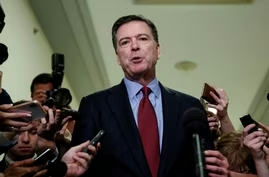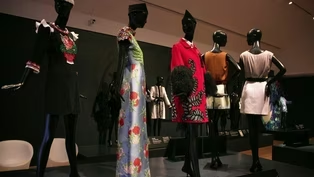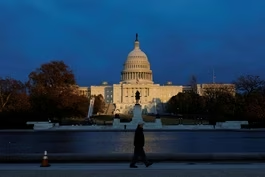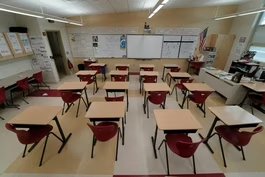
Bans on abortion pills give rise to underground networks
Clip: 11/19/2025 | 9m 21sVideo has Closed Captions
Underground networks for abortion pills appear as states limit access
Medication abortions account for more than 60 percent of all abortions in the United States, up from just a quarter a decade ago. But in the aftermath of Roe’s reversal, abortion pills are now banned in at least 14 states. Special correspondent Sarah Varney reports on the resulting rise of underground networks operating outside the legal system to help people access abortion medication.
Problems playing video? | Closed Captioning Feedback
Problems playing video? | Closed Captioning Feedback
Major corporate funding for the PBS News Hour is provided by BDO, BNSF, Consumer Cellular, American Cruise Lines, and Raymond James. Funding for the PBS NewsHour Weekend is provided by...

Bans on abortion pills give rise to underground networks
Clip: 11/19/2025 | 9m 21sVideo has Closed Captions
Medication abortions account for more than 60 percent of all abortions in the United States, up from just a quarter a decade ago. But in the aftermath of Roe’s reversal, abortion pills are now banned in at least 14 states. Special correspondent Sarah Varney reports on the resulting rise of underground networks operating outside the legal system to help people access abortion medication.
Problems playing video? | Closed Captioning Feedback
How to Watch PBS News Hour
PBS News Hour is available to stream on pbs.org and the free PBS App, available on iPhone, Apple TV, Android TV, Android smartphones, Amazon Fire TV, Amazon Fire Tablet, Roku, Samsung Smart TV, and Vizio.
Providing Support for PBS.org
Learn Moreabout PBS online sponsorshipGEOFF BENNETT: Today, medication abortions account for more than 60 percent of all abortions in the U.S., up from a quarter a decade ago.
But in the aftermath of the reversal of Roe v. Wade, abortion pills are now banned in at least 14 states.
Special correspondent Sarah Varney reports on the resulting rise of underground networks operating outside the legal system to help people access abortion medication.
And a note, some of the people featured in this story agreed to speak with the "News Hour" under the condition that we conceal their identities to minimize the legal and personal risks they face.
SARAH VARNEY: It's graduation day on the West Side of Chicago.
Gathered with family and friends, these women are celebrating their new lives as doulas.
Soon, they will spread out across the country to support people through pregnancy and childbirth.
WOMAN: Welcome home, doulas.
(CHEERING) SARAH VARNEY: But many of these doulas will also go on to help women end their pregnancies.
ASHABA, Teacher: They stand firm in the right of a person to give birth, to not give birth.
SARAH VARNEY: Their teacher, who goes by Ashaba (ph) to protect her identity, is part of an underground network.
She helps people in states where abortion is illegal get access to abortion medication.
ASHABA: I would just be like, hey, do you want to learn about abortion care?
SARAH VARNEY: To women in the South?
ASHABA: Yes, my neighbors, my friends, and they were like, yes.
They're crazy enough just like me.
(LAUGHTER) SARAH VARNEY: Ashaba says this word-of-mouth network stretches south from Illinois to Tennessee, Mississippi, and Louisiana.
ASHABA: I will put any of the information that they need or medicines that they need in here.
SARAH VARNEY: Equipped with pills and herbal remedies, Ashaba drives once a month through the south, delivering abortion supplies to fellow doulas, who give them to women in need.
Since the overturning of Roe v. Wade in 2022, demand has skyrocketed.
ASHABA: I just get up early in the morning and I drive straight through.
SARAH VARNEY: Ashaba says the network is helping women control their own bodies in a country that has not always allowed for that.
ASHABA: Abortion is a decision between a woman and herself, right?
When we go into the doctors, especially as Black women, indigenous women, we're not often heard.
SARAH VARNEY: But anti-abortion activists argue that women can't safely manage an abortion at home without a doctor.
JOHN SEAGO, President, Texas Right to Life: We couldn't have anticipated kind of the volume of orders, over 19,000 orders of abortion pills coming from Texas.
SARAH VARNEY: This year, Texas lawmakers took new steps to shut down the flow of abortion pills into and around the state.
JOHN SEAGO: This is a little bit more than just going to another state to buy a substance that is illegal here in Texas, right?
Texas has a state interest in protecting its citizens from the violence of abortion, both the mother and the child.
SARAH VARNEY: President of Texas right to life John Seago helped push for the law that will soon allow private citizens to sue anyone who distributes abortion pills to Texas residents.
JOHN SEAGO: I mean, this is getting pills in two little bags without medical instructions, without any oversight from a medical professional, without any accountability for follow-up care, or making sure that the drugs didn't have any adverse reactions to the patient.
It is too dangerous for women and their children for us to just kind of accept as the new norm.
ASHABA: I think it's been misguided that we are doing it with coat hangers or some other mechanism that is harmful to people.
By all the mechanisms that we use, it has been safe.
We haven't lost anybody yet.
SARAH VARNEY: Abortion pills are used widely across the globe.
In the U.S., six out of 10 women end a pregnancy using the medication.
And decades of research show the risk of major complications from taking abortion pills is 0.4 percent, safer than commonly used drugs like penicillin, Tylenol, or Viagra.
Still, in the states where these underground networks operate, what they are doing is against the law.
What's your understanding of the risk you're taking?
ASHABA: I understand that I can go to jail.
I understand that everything that I have worked for can be taken away.
SARAH VARNEY: And why?
Why are you willing to make that bet?
ASHABA: Because I have daughters, because I have friends, because I have loved ones that I want to see safe, and I know I cannot wait on a system that does not and has not cared for us.
MAN: Senator Pressley.
SARAH VARNEY: Last year, lawmakers in Louisiana reclassified mifepristone and misoprostol as controlled substances.
Having these drugs without a valid prescription now carries a prison sentence up to 10 years in the state.
But the way the networks are set up has made it difficult for law enforcement to disrupt them, says Elisa Wells.
ELISA WELLS, Co-Founder and Access Director, Plan C: They are operating outside of the formal regulatory system.
And so while they may be targeted, it's harder, we think, to shut them down.
SARAH VARNEY: Wells is the co-founder of PlanCPills.org.
The nonprofit provides information and education for accessing abortion pills at home.
ELISA WELLS: The community networks are a really unique form of access to abortion right now in the U.S., and it's a model that has been taken from other countries.
SARAH VARNEY: She says the underground networks were inspired by similar efforts in Mexico and Poland and are carrying on the legacy of groups like the Jane Collective, which helped women end their pregnancies when abortion was illegal in most parts of the U.S.
ELISA WELLS: I think it goes way back, even before the Janes to the whole history of midwifery and how women have taken care of each other and how women who were enslaved helped each other, using the Cotton Route itself, ironically, to help each other not be pregnant, often with the offspring of their oppressors.
SARAH VARNEY: In another corner of the South, a group of health care workers has launched their own network.
Even before the federal right to abortion was struck down, people around here had to drive two to three hours to reach an abortion clinic.
M, Health Care Worker: Being able to get an abortion by mail that you can do in your home is a real moment for poor folks.
It kind of puts the power in their hands.
SARAH VARNEY: M and E, who use initials to remain anonymous, started this network together.
They mail pills within their home state, and to avoid detection, they send the medication without packaging in a plain envelope.
E, Health Care Worker: I think people are concerned about what they're receiving is more often concerned whether it's real than whether it's dangerous.
M: That's how much risk these people are already in with a pregnancy that they don't want.
SARAH VARNEY: M and E say they know the risk they and the people they're helping are taking.
But, so far, there have been no known arrests in their state.
They're confident in how they have built the network.
They use encrypted messaging apps, get abortion pills from trusted sources.
M: And we sort of have this motto that we're going to move at the speed of trust.
SARAH VARNEY: How are you kind of staying ahead of the shifting legal framework at the national level?
M: We, I think, just make it a practice to be ready to pivot.
If you're trying to stand up straight with your knees locked on a surfboard, you're going to fall off.
But if you're loose and you're ready for the wave, then you have a better chance of staying on the board.
SARAH VARNEY: There are about five members in the group, but they can serve up to 100 people a month.
We asked M to read some of the messages women wrote to her.
M: "I'm needing help with an unplanned pregnancy because I'm financially and emotionally unable to give them what they deserve.
Please consider this is the first time I have ever asked for help with a situation of this caliber."
This one says: "Hello.
I was given this e-mail from a friend because I was needing some help with abortion pills, and I can't afford literally anything right now.
Thank you in advance, even if it's just for your time."
SARAH VARNEY: E says they built the network to make sure they can help women for years to come.
E: You know, there's been times when there's been weather events and someone else in the network couldn't mail and other people pick it up.
And I think a lot of us are focused on building resiliency into our work, so that, when something happens, we have the ability to take a beat and figure it out.
M: We want to be like a coyote.
A coyote can just survive in a worksite that is building on top of its former habitat.
ASHABA: You know, growing out here will be the herbs for abortion care.
SARAH VARNEY: After making the long drive from Chicago, Ashaba shows us around her Louisiana home that will soon become a safe place where women can self-manage in abortion.
ASHABA: We have been planted in so many other places that, if one of us falls, the whole network doesn't fall.
There's other people that are still capable and able to provide services.
SARAH VARNEY: And she says her network will keep on adapting.
For "PBS News Hour," I'm Sarah Varney in Louisiana.
Comey seeks to have case dropped over handling of indictment
Video has Closed Captions
Clip: 11/19/2025 | 6m 21s | Comey seeks to have indictment dismissed over DOJ's handling of case (6m 21s)
Exhibition showcases work of fashion designer Andrew Gn
Video has Closed Captions
Clip: 11/19/2025 | 5m 17s | Exhibition showcases pioneering work of fashion designer Andrew Gn (5m 17s)
Poll reveals signs of hope for Democrats, red flags for GOP
Video has Closed Captions
Clip: 11/19/2025 | 5m 1s | New poll reveals signs of hope for Democrats and red flags for Republicans (5m 1s)
Teachers, parents weigh benefits and risks of AI in schools
Video has Closed Captions
Clip: 11/19/2025 | 13m 15s | Teachers and parents weigh benefits and risks of artificial intelligence in schools (13m 15s)
Trump, MBS unveil ventures on rare minerals and nuclear tech
Video has Closed Captions
Clip: 11/19/2025 | 6m 54s | Trump and MBS unveil U.S.-Saudi ventures on rare earth minerals and nuclear energy (6m 54s)
Providing Support for PBS.org
Learn Moreabout PBS online sponsorship
- News and Public Affairs

FRONTLINE is investigative journalism that questions, explains and changes our world.

- News and Public Affairs

Amanpour and Company features conversations with leaders and decision makers.












Support for PBS provided by:
Major corporate funding for the PBS News Hour is provided by BDO, BNSF, Consumer Cellular, American Cruise Lines, and Raymond James. Funding for the PBS NewsHour Weekend is provided by...





